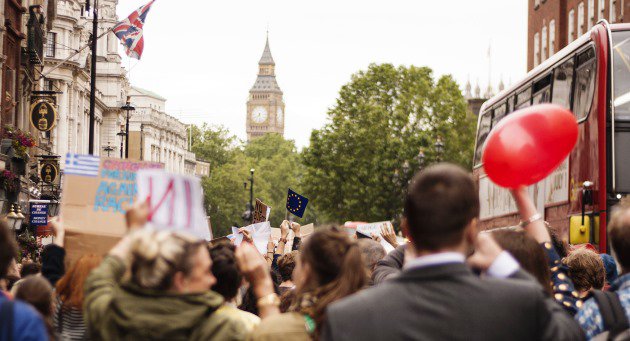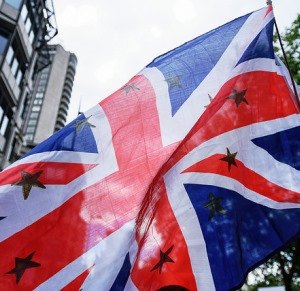In March 2019, Great Britain will leave the EU. What does that mean for Europe’s future security policy? The core course spoke with representatives of the British Embassy about Great Britain’s future role in Europe. The talks also focussed on relations with Russia.

In Great Britian, Brexit is highly controversial debated. The picture shows EU proponents, that walk towards the parliament in Central London after the referendum in 2016. Picture: Sam Greenhalgh/Flickr/CC BY 2.0
In March 2017, London submitted its withdrawal from the European Union. Opponents of Brexit on both sides of the English Channel are hoping that the process can still be stopped. However, the 2018 core course’s visit to the British Embassy made it clear that there is no reasonable way to reverse the decision. A second referendum is unlikely and would not provide a sound basis for a government in London.

On Her Majesty's Secret Service- with or without the EU. While Brexit is omnipresent in everday life, many members of the government want to return to the normal order of things. Picture: Ungry Young Man/Flickr/CC BY 2.0
The diplomats at the embassy say that Great Britain will continue to share the EU countries’ values and interests even after Brexit. They assured us that Great Britain would remain a committed partner and defend European security, for example through the rotating presence of NATO forces in the Baltic states. Nevertheless, the United Kingdom is often accused of “cherry-picking” during the ongoing Brexit negotiations with Brussels, an accusation the diplomats believe is unfair. They see a need for agreements between the EU and Great Britain that go beyond those with third countries, but say it is difficult to communicate this position in Brussels. At the moment, this topic is dominating day-to-day work at the British Embassy, where everyone wants more than anything to return to the normal order of things.

After Brexit: will Great Britain continue to share the values and interests of the EU states?
Picture: sgoldswo/Flickr/CC BY NC ND 2.0
Great Britain’s Russia Policy
Another point of focus in our discussions with the embassy personnel was Great Britain’s Russia policy. According to the embassy representatives, the poisoning of former Russian agent Sergei Skripal illustrates how Russia is threatening the shared values of the Western world. As they see it, the incident in Salisbury is one more item on the list of aggressive patterns of behaviour such as the annexation of Crimea or cyberattacks on IT structures. In their view, the Western nations now need coordinated action and a common response. Accordingly, they believe that the expulsion of Russian diplomats from many Western countries sent an important signal. Despite all the difficulties, the British Embassy personnel emphasised both that it is essential to remain in dialogue with Russia, and that Great Britain expects Russia to indicate its willingness to cooperate.
Authors: Participants in the 2018 core course
